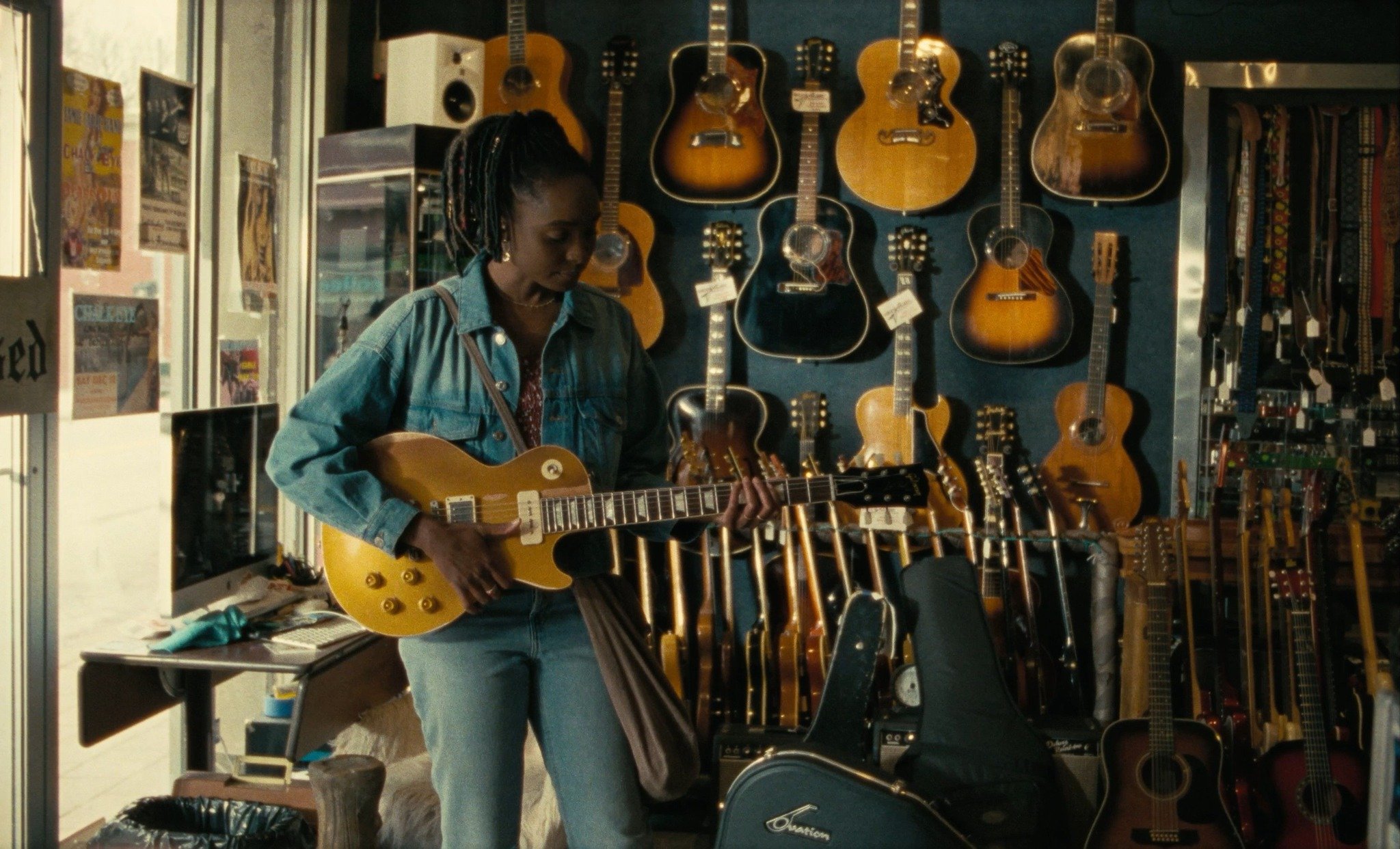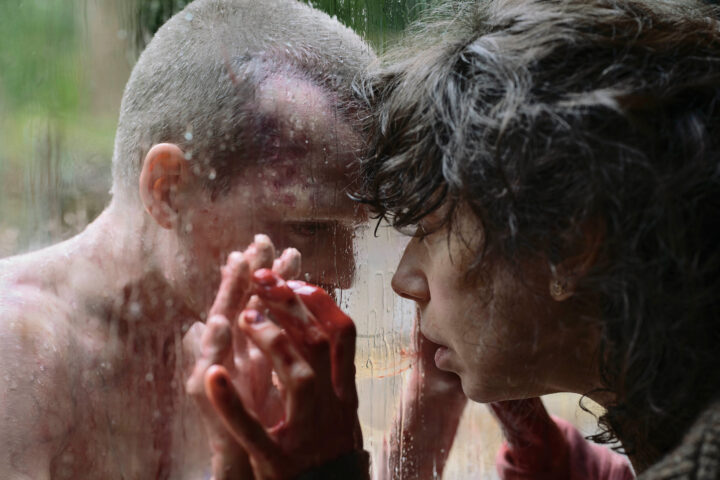In Nicole Riegel’s new Dandelion (IFC Films, July 21), star Kiki Layne plays a not-so-young Cincinnati musician fiercely committed to doing things her way, and to finding a home onstage that is uniquely hers across spaces that are not always welcoming to Black female artists. Her trek takes her from the doldrums of singing in Cincinnati hotel restaurants to performing at a biker festival in the Black Hills of South Dakota in a valiant effort to create music with meaning. Her Dandelion, an artist hanging onto a dream and in need of one good break, well knows the stakes of age, competition and self-doubt.
Like her onscreen counterpart, Layne decided early that she would not be deterred in pursuit of the artist’s way, growing up in Cincinnati to study music and acting before landing in Chicago’s esteemed DePaul theater program. It was Chicago that gave Layne the training ground rigor she’s employed in building a successful movie career, which includes her high-profile debut in Barry Jenkins’ If Beale Street Could Talk as well as memorable turns in Coming 2 America, The Old Guard and Don’t Worry Darling.
She has a full-bodied lead role in Riegel’s new film, a road movie about a dream, and one with an sense of discovery in both Dandelion’s struggle for self-actualization and Layne’s determined performance, Riegel giving the gifted, thirty-two-year-old actress space to write, perform and even fall in love onscreen. Throughout, Layne captures the unpredictability and ups-and-downs of an artist’s heart; hers is a melodic tribute to striving performers and undaunted dream chasers determined to make it their way. By the time the picture concludes, the actress has taken us somewhere lyrically (she wrote many of the film’s musical verses) and artistically, to a hard-won place of creative fulfillment for character and actress.
I recently caught up with Kiki Layne to chat about her Dandelion performance, exploring ideas of artistic self-expression, her formative years in Chicago, what it takes to make it in the movie industry today and her personal approach to songwriting, including substantial contributions to her movie.
You wanted to sing when you were seven years old, and later auditioned for School for Creative and Performing Arts in Cincinnati. I believe you wanted to sing before you wanted to act.
KL: At the same time! I wanted to do both. Any time someone would ask me what I wanted to be when I grew up it was ‘a singer and an actress.’
And there was never anything else?
KL: Nope. That was it. Crazy me!
In addition to acting and singing in Dandelion, did you also write the film’s songs?
Kiki Layne: Well, I contributed to them. The song Over-the-Rhine—the one that we see my character recording in the studio—was originally called The Ghosts of Cincinnati, written by Nicole and the Dessners. And that song has been released by Aaron’s band, Big Red Machine. It references the Over-the-Rhine area in Cincinnati. I said to Nicole that it didn’t feel right that Dandelion was being portrayed by a Black actress and a song about the Over-the-Rhine area didn’t talk about how the area has been overly gentrified, and that now, for the people that look like me, there’s no longer space for us.
What has the Over-the-Rhine neighborhood represented in the past? What kind of community is it?
KL: Over-the-Rhine was predominantly Black. It started off German but that was way back. But for a long time it was a predominantly Black community. And now we’re being priced out. They’ve dropped a soccer stadium on top of us. It is just becoming less and less affordable. Now they are doing all of these nice things in the area that they didn’t do when it was us.
That’s happened here as well. When you see a Whole Foods enter the area, you know it’s happening.
KL: They put a Kroger there, which is essentially Whole Foods adjacent. Kroger is our main grocery store and it’s next level. But when it was a predominantly Black community, there was a Kroger there that they didn’t care about and ended up closing. So it’s things like that.
And you wrote about this in the song.
KL: Yes, because I realized that I couldn’t sing the song that they had written. I couldn’t talk about that area and not talk about the gentrification. And so that’s where Over-the-Rhine came from—myself and our guitar teacher, Noah Harmon, who actually became the music supervisor on the film because he contributed so much to helping us rework the music and to making sure we were comfortable with it. He started playing that rhythm and the words just started coming out of me. We ended up writing this song together.
I think the experience of watching the area change was so visceral that the words just started to come out. I made sure to use some of the lyrics from The Ghosts of Cincinnati. That song holds a place in the film and I wanted to make sure that we were still honoring Nicole’s and the Dessners’ vision for how the song fit into the plot while also honoring the truth of my experience as a young Black woman watching that area change.
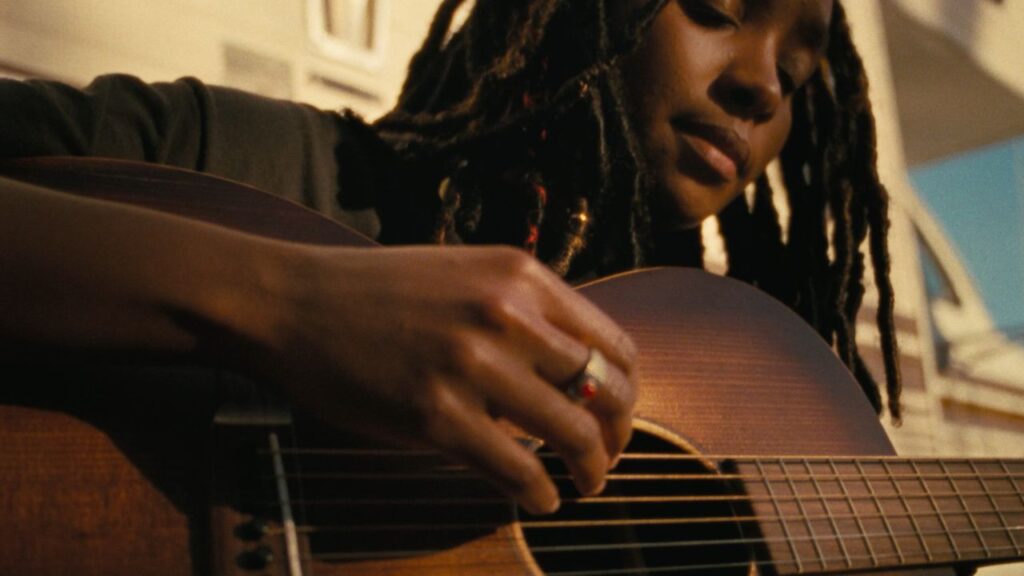
So in a way, you co-authored part of the film.
KL: Well, I guess in a way, since the music is such a massive part, but that’s one of the things for which I’m super grateful—that Nicole and the Dessners created that space, because it was one of the things that Nicole and I first talked about when I joined the film. I was super excited to work with Bryce and Aaron (Dessner) from The National. But we have to acknowledge that these are two white men in their mid-forties and I’m a thirty-two-year-old Black woman, and the music that they’re writing has to sound like it’s coming out of this instrument.
At one point we were all on a Zoom call and I said, ‘I know that you guys wrote this music and that Dandelion is an indie folk artist. My folk look a little different than Aaron’s and Bryce’s. So we have to make space for what that means and how Dandelion will express herself.’ I’m grateful that they created space for me to be able to do that. So Over-the-Rhine is a profound example of this as is the finale song, River Ten Feet Deep. The lyrics are still mostly what Aaron and Nicole wrote, but rhythmically it was not speaking to me. So Noah and I started trying to figure out what rhythm would really bring together everything that Dandelion had been through. Because what became a big through line in the film is Dandelion being in these predominantly white spaces…
And very male.
KL: Yes, exactly. And questioning, ‘What am I doing here? What space is there for me on this stage?’
There’s an effective moment illustrating this when you first arrive in South Dakota and you’re walking across the crowd. The tracking shot says quite a bit about what you are describing.
KL: Exactly! So what brings all of that together? What honors the kind of groundwork that Nicole was laying out in these shots and these moments of showing Dandelion as an outsider questioning, ’Is there space for me here?’ Noah and I got together and really tried to figure out what rhythm felt like Dandelion would be standing in the truth of herself and her artistry and saying, ‘Fuck you guys. I’m here, in this body, with this voice and in these musical stylings, and you better get onboard.’
Early in the film, Dandelion has such a moment while speaking to her mother. She says, ‘It doesn’t matter if I’m singing in a restaurant and it doesn’t matter if I’m singing in a bar,’ and that she just has to be singing. I thought the film was really smart about honoring that drive and the creative will of an artist. We don’t see that very often. There are many movie characters that are all about achieving; there’s some big journey. But hers is a very internal drive toward a passion that is not going away. I saw that in her in the movie—always pushing and evolving and trying to self-actualize. It’s not a big achievement thing. But at the end of the movie when she is on the stage, I felt like I was seeing a totally different person, performance-wise, than I had met earlier in movie. She had gone somewhere.
KL: Yes. That’s one of the things that made me feel I had to do this film. In other music films, usually they’re about down-and-out artists working really hard and by the end they’re the greatest superstars in the world.
Which is like 0.01% of musicians, right? Maybe less.
KL: Exactly. So I think people respond to this film because it feels more grounded and truthful to what the majority of artists go through in the issues we see Dandelion and Casey wrestling with: ‘Is this keeping the lights or am I just scraping by? If I get this nine-to-five maybe I’d have a little extra cash.’ You see her wrestling with these things and it’s like, ‘Okay, I’m 30 now. What does that mean?’ The film explores all of these things that feel so real to the artist’s journey.
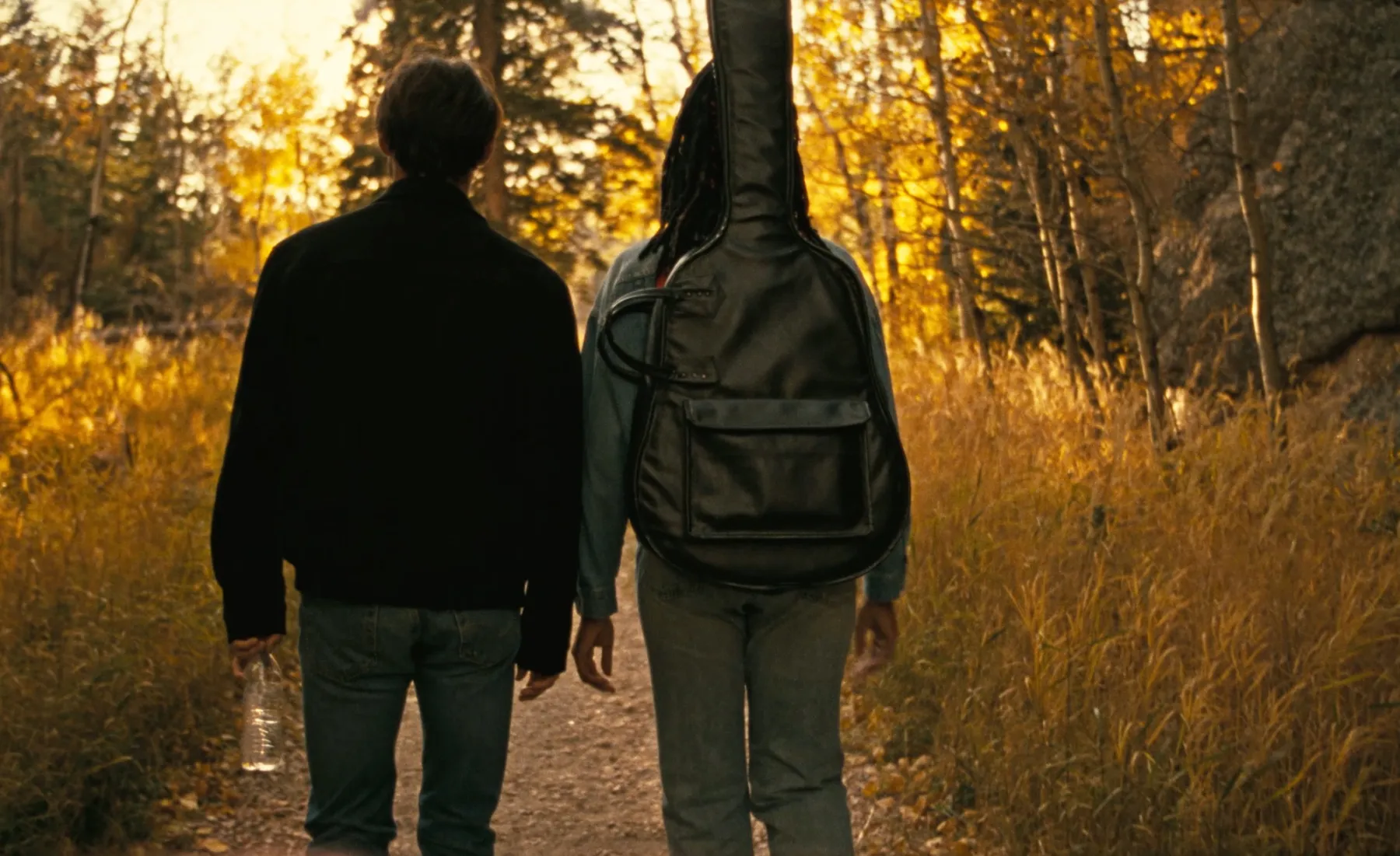
It’s a moment to moment situation in the movie. She strikes out on the road. She doesn’t know anybody. She doesn’t know what she’s going to find when she gets there. She gets there. It’s sort of like moment to moment living, right? That felt fresh.
KL: Nicole does that so well. You’re in these moments with her characters.
It also felt that way between you and co-star Thomas Doherty. There is a sequence where you go riding together in the Black Hills which appears to have been shot during the ‘magic hour.’ And there’s a two-shot of your faces; sort of a quiet, extended scene. I was getting comfortable just spending time out there with you both on that rock, wondering what might happen.
KL: I love the way that Nicole did, just giving us the opportunity to be in the moment with the characters. Nothing ever felt rushed. There are many of these moments, like when Dandelion rushes up on the stage in South Dakota. You sit with her in all of the angst of like, ‘Oh shit. I drove to South Dakota. I’m on the stage. My guitar string is broken. I didn’t really finish this song but I’m up here now and I’m singing.’ We get to live in those moments with these characters. And I think that makes it feel more real because so many artists get up on stage and are like, ‘Fuck, what am I about to do?’ Even as an actor, sometimes I go out and I am like, ‘What is my first line?’ And then my mouth starts working and something comes out.
Let’s talk about Thomas and your onscreen connection. There are moments—for example, where he’s playing music and you’re listening and watching him, and the camera observes you almost more than him, that we can see your characters falling in love with each other’s creativity. You can see this in the close-ups. Also, the moment late in the film when Dandelion discovers his Casey in the hotel room with his family. Tell me a bit about how you crafted falling in love in the movie together, as in those small moments when you’re sitting in the RV having breakfast or just walking around fields of flowers. It’s nice connection.
KL: I think Thomas and I were able to connect very quickly because for me, chemistry is about feeling safe with your scene partner, and I think both of us were able to find that safety pretty quickly because in our initial conversations both of us opened up about what the film meant to us. I told him this film meant a lot to me because I was finally expressing myself as a vocalist and sharing my singing and songwriting.
And for him, the film allowed him to dig into a meatier, more mature role than the types he’s been playing. And so I think both of us being able to say that this really meant something to us helped create that safe space to step out of our comfort zones and go on this journey together. We both connected so deeply to what these artists were going through. You mentioned that that scene where Dandelion discovers that Casey has a family. I think it feels earned because you see what he’s been wrestling with.
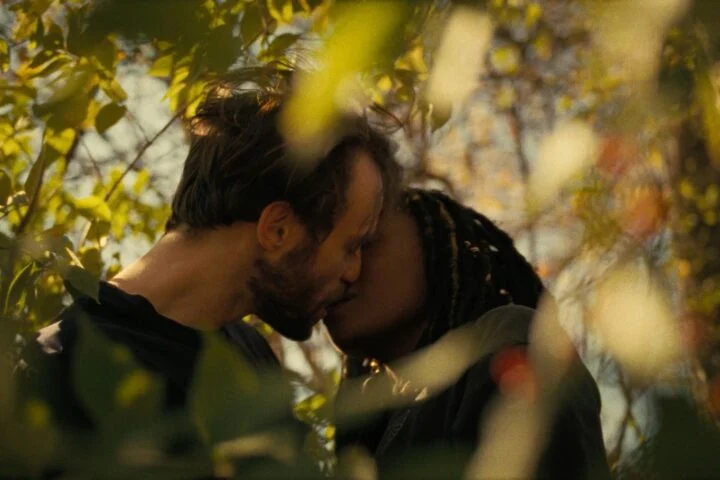
Yes and it is painful for him, too.
KL: Exactly. He still wants to make the music. He still wants to be a part of that world. It feeds him in such a special way. But he’s also getting older, and it is like, ‘Are we selling out arenas, and isn’t that what we’re trying to do this for?’ We both could connect to that. Even when you’ve reached certain levels of success—obviously Thomas and I are two very blessed artists—you’re still wrestling. There’s more that you want to do or different stories that you’re trying to tell, but the industry isn’t making space for it and you feel like you’re being contorted to present yourself in a way that feels inauthentic, or be on social media every hour. It’s these things that felt very real for us and that we could pour into the roles together. I think that’s where the chemistry came from.
There’s this moment where you say, ‘I was going to have this big break. I was going to open for this band that became very big. And all of my friends who were doing this have now made it, and I just didn’t get that break because I had other things I had to take care of.’ It made me consider your big break with Barry Jenkins in If Beale Street Could Talk upon coming out of DePaul. Do you ever think what your road might have been if Barry Jenkins hadn’t come along?
KL: Absolutely. One of the things that can feel so frustrating about being an artist is that you’re just one great audition away. You just need one person to see you and take a chance on you. Barry took a chance on me. I was a no-name actor. I didn’t have many credits. I think the only credit I had camera-wise was an episode of Chicago Med! That’s it! So as an artist, I know that tension of feeling so far away and so close at the same time. It is mind-boggling, and it’s the thing that keeps you going but also keeps you up at night: ‘I’m so close…but I’m still so far away.’ I am 32 right now, and with Dandelion I felt the feeling of seeing twelve-year-olds make millions of dollars on YouTube. And you’re like, ‘I’ve made some mistakes in my life.’ (laughter)
Right. It doesn’t seem to require that much talent to make it today. This is a bigger conversation about the culture and how people get famous, stay famous and why.
KL: And we see Dandelion struggling with that. She’s scrolling through Instagram and seeing how so-and-so has however many followers. Why? I love that montage of her looking at the different social media like pages, which happens while Over-the-Rhine is playing because the lyrics and subject of the song are so meaningful. It has so much heart to it. And then you’re witnessing her scrolling through all of the BS on social media, looking at these girls who can’t play guitar as well as she can and certainly can’t write with the depth that she can write. And yet they’re everywhere.
What would you say to the thirty-nine-year-old troubadours—as called in the film—maybe in Cincinnati, still working in hotel lounges because they have a passion for singing and still believing in it? What advice would you offer?
KL: Definitely to ‘Check your gauge. Do you still love it?’ That’s the first measure. And then ask yourself if you are actually doing some of the things that you used to dream about. Recently, I was talking to a friend who reminded me, ‘Kiki, you’ve been paying your bills with acting for almost a decade now. Prior to booking If Beale Street Could Talk, your last day job was in 2015.’ And it struck me that I’m doing the thing that I used to dream about. I’m living so many of the things that I prayed for. Yes, it’s really hard sometimes. It can be so exhausting. But I’m doing it.
So to that person singing in that club or bar, I would ask, ’Is it keeping your lights on? Is there food on your table? Is your spirit still full? Isn’t that what you used to dream about—being able to sing and provide for yourself? Maybe you don’t have all the luxuries in the world, but you’re still operating in something that is a blessing.’
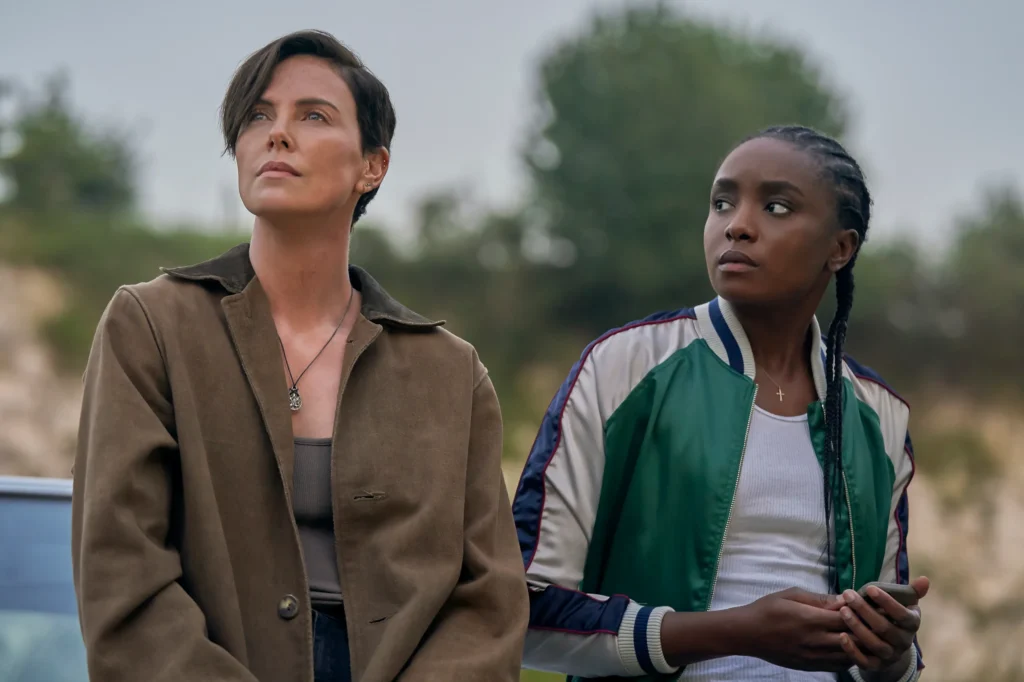
Tell me a bit about working on The Old Guard.
KL: (Laughs) It was amazing!
A bit different than Dandelion!
KL: Just a little! We did shoot the second one. Being able to be in an action movie with Uma Thurman and Charlize Theron—that’s it! As a female actor, what is bigger than that given what they did for women in the action genre? So to be standing there with the both of them blew my mind.
You also worked with Luca Guadagnino, also. He’s having a big moment this year. He has the great, combined sensibilities of fashion and style and cinema. Tell me about making The Staggering Girl.
KL: It was great working with Luca and working with Julianne (Moore). It was a short and sweet time in Rome. I had zero complaints! Luca is a visionary. And you see it reflected in his work. What an amazing artist to create with and play dress up with! And Valentino!
Are there a list of people I’d like to work with? Who would be at the top?
KL: Definitely Luca, again. I would love to do a full feature with him. Who else is on my list? Oh my gosh. This is one of those questions where there are a thousand answers and then they all just go poof! I would love to work with Viola Davis. There’s so much to learn. I would love to work with her. She’s one of those people from whom you can only walk away a better artist after having worked with her.
Yes, and even if she says little in a scene, she always brings immense gravitas. It doesn’t matter what she’s in—she always has that.
KL: Because she’s in it. She’s in it. You can be in something without speaking. And she does that so well.
Do you think there many actors in the younger generation that do that? Or does it belong more to Viola’s generation or Meryl Streep’s generation? Is there some kind of difference?
KL: I think so, because now there are all these other things I feel that younger generations are dealing with, particularly the social media aspect. I feel like that’s really created a difference; it’s so for show. And I think as Meryl and Viola and Denzel Washington were coming up, it was just about the craft. I think that makes a big difference. I recently heard Viola say something along the lines of being pretty has nothing to do with being a great actor. In this world, it has a lot to do with being famous and being in Hollywood. But in terms of the actual craft, who gives a shit if you’re pretty?
If you looked back to the 70s or even the 80s, people could get famous with crooked teeth or without looking all that photogenic, because they were just really good. Today, there are great talents on Broadway who could easily transition to movies, but in this moment that rarely can happen unless they look perfect.
KL: Exactly, so I think younger artists are being forced to wrestle with this in a way that was not true of older artists—either you were good or you weren’t. The end. No one was asking how many followers you had as a qualification for whether you deserved the role. You either got in that room and you out-acted everyone or you didn’t. I think that’s why theater still means so much to me, because it is an opportunity to get away from all of this. It doesn’t matter.
What do you remember most from your acting education? Do you think about those DePaul theater days when you step onto a movie set today?
KL: Absolutely. When I think about the DePaul days, or really just about my Chicago days, I think about the work ethic that being in Chicago instilled in me, one I didn’t even realize was so profound until I was in LA and showed up to a director’s session and the director said, ‘Oh, you’re memorized.’ And I thought, ‘This is a director’s session. Who is showing up not memorized?’ And that was when I started to get an understanding that by being in this (Chicago) community of artists I learned things that I have carried with me—a commitment to the craft and to the work.
All of the Hollywood fou-fou stuff is cool, but then, how are you telling this story? Are you willing to get messy? And are you willing to dig deep into the story and also dig deep into yourself? That’s one of my favorite things about Chicago artists and seeing the work at the Goodman, Steppenwolf and even the storefront theaters. There is a level of depth and willingness to ‘go there’ and not care about being pretty or not. For the majority of the most interesting roles, being pretty has nothing to do with it.
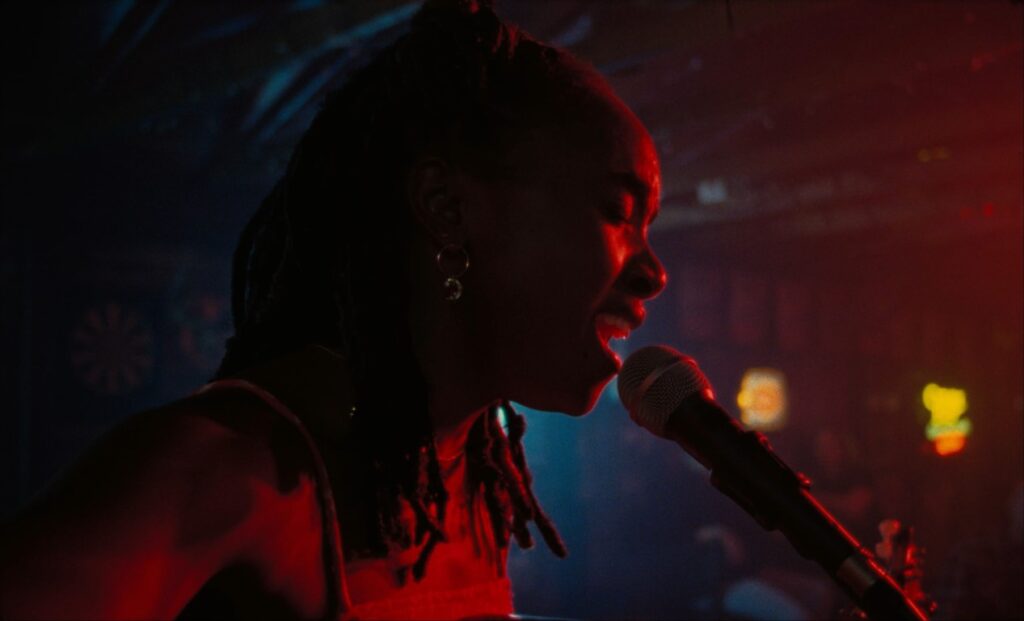
Let’s talk about songwriting. For those of us who are not musically inclined, we can’t imagine what happens when somebody sits down to write a song. On a recent road trip I listened to that new Taylor Swift album that’s got thirty-one songs on it and thought, ‘How is she writing thirty-one songs for an album?’ What is that? When you sit down to write a song, whether for Dandelion or otherwise, where does it start?
KL: For me, songs start with the track; with whatever instrumental rhythm that I’m writing to. And then from there, a melody starts forming and I feel my brain leading me to some subject matter. And then once I can lock in that it’s a love song, a sad song or a song about my family, then lyrics will come. Some songs come right out of me, like Over-the-Rhine. Noah started playing that guitar riff and it just started coming. And then there’s some like what we were doing with River Ten Feet Deep. Noah and I were trying so much. It was like, ‘That doesn’t work. Should we put these lyrics here? Wait, now this is the chorus… I don’t know, this still doesn’t feel right.’
It’s like what you see in the film. Dandelion trying to crack that song is truly what Noah and I were going through. And then finally you get it and it’s like, ‘Holy shit!’ Or at least you hope so because sometimes you finish it and you think, ‘This still sucks, but it’s okay.’ I learned a lot on the way, but that one in particular, once we got it and we could really imagine how it would sound with the drums and all of that, we knew we had gotten something that honored everything that Dandelion had been through up to that moment.
At the end of the film, when she does that big number you are referring to, it’s such an important moment of performance. But perhaps not one that will necessarily be followed by a hit record.
KL: She’s not going explode or whatever, but she does honor herself as an artist and she ‘makes it’ in some sense, at least regionally to begin.
How would you define her success?
KL: I think it’s her standing firm in who she is. She’s standing firm in her body as a Black woman. She’s standing firm in her voice. She’s standing firm and, as I said, in all of the folk that she brings with her; all of the different inspirations that she has had throughout this journey. And she’s just standing. It’s ten feet deep and she’s in it. This is her in her bright pink suit from Zara—and I love that it is from Zara, because that’s so perfect. It’s bright. You get that pink suit! I think that’s what that moment is for me. As she walks into this space, she is no longer concerned that it could be nothing but white men. She walks in. This is her. And there’s an audience for it. I think it leaves the movie audience with hope that she can take that somewhere. We don’t know if it’s to become ‘Lady Gaga superstar,’ but it’s something. She’s onto something.
What has been the best part about your job? What do you love about doing this?
KL: Just playing in different worlds and connecting to different parts of myself through the characters that I play. Like playing Tish (in If Beale Street Could Talk), I got to connect to a much more vulnerable part of myself, more willing to lean on the people around me. I take pride in being the strong one; the person that my friends can lean on. And so it was profound to play a character that allowed me to be vulnerable and do the opposite. And playing Dandelion, it was connecting to the music and reconnecting to that side of me.
It’s always been there. Even in performing arts school, I was into instrumental music. I was writing songs at the time. But playing a character who prioritizes her music above everything else really touched me. That’s what I love about acting. It reveals things about you because (doing it) you have to connect; there has to be something real that you see in that character that’s also real in you. From there, the character blossoms. So being surprised by what’s in me that a character brings out.
This interview has been edited for length and clarity.
